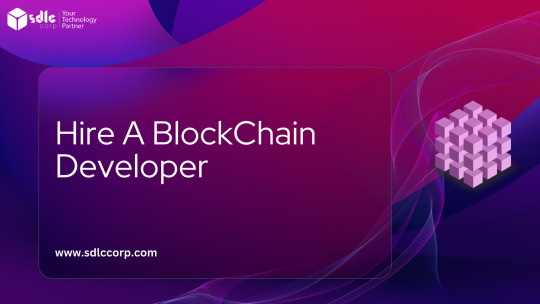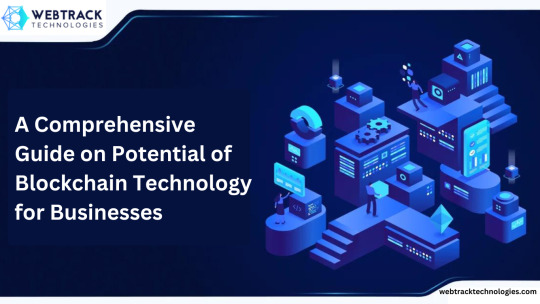#Hire blockchain developer
Explore tagged Tumblr posts
Text
Effective Strategies to Hire Blockchain Developers
No more hassle to find and hire top blockchain developers for your organization. Checkout this detailed video on and learn some of the effective strategies on how to hire blockchain developer.
0 notes
Text
Private Blockchain Development: Unlocking the Power of Enterprise Solutions

Private blockchain technology is becoming a crucial tool for businesses looking to enhance security, streamline operations, and build trust across their ecosystems. Unlike public blockchains, which are open to everyone, private blockchains offer a closed, permissioned network where only authorized participants can join. This controlled access allows enterprises to maintain higher security standards, protect sensitive data, and optimize their business processes.
What is Private Blockchain?
Private blockchains, also known as permissioned blockchains, operate in a more controlled environment than their public counterparts. In these blockchains, only approved members can access and participate in the network. While this approach may seem to contradict the open, decentralized nature of blockchain technology, it actually provides numerous advantages for businesses, especially in terms of governance, scalability, and performance.
Private blockchains enable enterprises to manage their networks more efficiently. Each participant in a private blockchain is authenticated and authorized, ensuring only trusted entities can read, write, or audit the blockchain. Additionally, because private blockchains do not require the same level of consensus as public blockchains (like Proof-of-Work or Proof-of-Stake), they offer faster transaction speeds and lower costs.
Key Benefits of Private Blockchain for Businesses
Enhanced Security: One of the main reasons businesses prefer private blockchains is the enhanced security they offer. With fewer participants, the chances of malicious attacks or data breaches are significantly reduced. In sectors like finance, healthcare, and supply chain management, where data privacy is paramount, private blockchains ensure that sensitive information remains secure and accessible only to trusted parties.
Improved Efficiency: Private blockchains allow enterprises to streamline their operations by automating various processes. For instance, the use of smart contracts—self-executing contracts with the terms of the agreement directly written into the code—enables companies to automate payments, streamline supply chains, and manage inventories more effectively.
Cost-Effective Solutions: Private blockchains can lower operational costs by reducing the need for intermediaries and enabling faster transactions. According to a recent report by PwC, companies that implement blockchain technology can reduce costs associated with financial reconciliation by up to 70%.
Regulatory Compliance: Private blockchains offer the flexibility to comply with industry regulations. For example, in the financial sector, businesses can create blockchains that adhere to specific compliance rules, ensuring all transactions are transparent and auditable while maintaining control over who can view the data.
Scalability: Unlike public blockchains, which often suffer from scalability issues due to large numbers of users and slow transaction processing times, private blockchains are designed for scalability. Since they operate in a closed environment with fewer participants, private blockchains can process transactions faster, making them ideal for enterprise applications.
Real-World Applications of Private Blockchain
Private blockchain technology is being used across a variety of industries:
Supply Chain Management: Companies like Walmart and IBM are using private blockchains to improve transparency and traceability in their supply chains, ensuring that products are sourced ethically and delivered efficiently.
Healthcare: Private blockchains are being utilized to securely store and share patient data, ensuring that only authorized personnel can access sensitive medical records while complying with privacy regulations like HIPAA.
Finance: Financial institutions are using private blockchains to streamline cross-border payments, reduce settlement times, and ensure compliance with regulations such as KYC (Know Your Customer) and AML (Anti-Money Laundering).
Real Estate: The real estate industry is leveraging private blockchains for property transactions, allowing buyers and sellers to securely transfer ownership and manage contracts without the need for intermediaries.
Conclusion: Mobiloitte—Your Trusted Private Blockchain Development Partner
As businesses increasingly turn to private blockchain technology to enhance security, streamline operations, and achieve regulatory compliance, the need for a reliable development partner becomes paramount. Mobiloitte, a leading private blockchain development company, offers cutting-edge solutions tailored to your enterprise needs. With a team of seasoned blockchain experts, Mobiloitte ensures that your private blockchain is secure, scalable, and efficient, providing a strong foundation for your business to thrive in the digital age.
If you're looking for a trusted partner to help you navigate the complexities of private blockchain development, Mobiloitte is the right choice. From initial consultation to deployment and ongoing support, Mobiloitte's end-to-end solutions will help your business harness the full potential of blockchain technology for a competitive advantage.
#Private blockchain centralized#Blockchain Development Company#Hire Blockchain Developer#Private blockchain development#Private blockchain developers#Top private blockchain development companies#Top private blockchain developers#Blockchain development company in Singapore#Solana blockchain development company#Token development company#Hyperledger blockchain development services.
0 notes
Text
Hire a Blockchain Developer

Introduction
In today's rapidly evolving digital landscape, businesses are increasingly turning to blockchain technology to enhance security, improve transparency, and streamline operations. As the demand for blockchain solutions grows, hiring a skilled blockchain developer is becoming a top priority. But with so many options available, how do you ensure that you hire blockchain development talent that meets your needs?
In this post, we will explore the essential factors you should consider when you decide to hire a blockchain developer. Whether you are building a decentralized application (DApp), a cryptocurrency platform, or a secure blockchain infrastructure, choosing the right developer is crucial for your project's success.
Why You Should Hire Blockchain Developers
Blockchain developers are skilled professionals who understand the complexities of blockchain architecture and protocols. By hiring blockchain developers, you gain access to specialized knowledge and expertise that can significantly contribute to the development of high-quality blockchain applications. Here's why you should consider hiring blockchain developers:
Expertise in Blockchain Technologies: Blockchain developers have in-depth knowledge of key blockchain frameworks such as Ethereum, Hyperledger, and Solana. They are proficient in programming languages like Solidity, JavaScript, and Go, ensuring your project is built using the most suitable technology stack.
Custom Blockchain Solutions: Blockchain developers have the expertise to create customized blockchain solutions that align with your business goals. Whether you need to build smart contracts, decentralized applications, or blockchain-based payment systems, hiring a blockchain application developer will help bring your vision to life.
Enhanced Security: Blockchain’s decentralized nature provides unparalleled security. A skilled blockchain developer will ensure that your application is not only functional but also secure, protecting your data and transactions from malicious attacks.
Scalability and Efficiency: As businesses scale, the need for scalable blockchain solutions becomes more prominent. Hiring a blockchain coder or specialist ensures that your project is built to handle increasing demands without compromising on performance or security.
How to Hire Blockchain Developers
When you are ready to hire blockchain developers, you need to approach the process strategically. Here’s a step-by-step guide to hiring the right blockchain developer for your project:
Understand Your Project’s Needs: Before you hire blockchain developers, clearly define your project goals. Are you building a cryptocurrency exchange? Or do you need a decentralized application? Understanding your project’s scope will help you find the right skill set.
Evaluate Experience and Portfolio: Look for blockchain developers who have hands-on experience in building blockchain solutions. Review their portfolios to assess the quality and complexity of their previous work. The more experience they have with your specific blockchain platform, the better.
Technical Expertise: A skilled blockchain developer should be well-versed in blockchain technologies like Ethereum, Bitcoin, and smart contracts. Make sure that they are proficient in the tools and frameworks necessary to meet your project’s requirements.
Discuss Cost to Hire Blockchain Developer: The cost to hire a blockchain developer can vary depending on their location, experience, and the complexity of your project. Generally, blockchain developers from regions like North America or Western Europe tend to have higher rates compared to developers from Eastern Europe or Asia.
Cultural Fit and Communication Skills: Ensure that the blockchain developer you hire is a good cultural fit for your team. Effective communication is key to the success of any project, and blockchain development is no different. Make sure the developer can explain complex technical concepts in a way that everyone on your team can understand.
Where to Find the Best Blockchain Developers
There are several places to look when hiring blockchain developers:
Freelance Platforms: Websites like Upwork, Freelancer, and Toptal offer access to a pool of blockchain developers with varying levels of expertise. You can browse their profiles, check reviews, and hire developers for specific tasks.
Blockchain Development Agencies: If you’re looking for a dedicated team to work on your project, hiring a blockchain development agency might be a good option. These agencies have teams of developers who specialize in different blockchain technologies.
Job Boards: If you're looking to hire a blockchain developer full-time, blockchain developer jobs can be posted on platforms like LinkedIn, Indeed, and AngelList. This allows you to find qualified candidates who are looking for long-term employment opportunities.
Conclusion
Hiring the right blockchain developer is crucial for the success of your project. Whether you choose to hire blockchain application developers for a short-term contract or hire a blockchain developer full-time, it’s essential to thoroughly assess their technical skills, experience, and ability to meet your project’s unique requirements.
By following the steps outlined in this guide, you can ensure that you hire a blockchain developer who is equipped to deliver high-quality solutions that meet your business goals.
#hire blockchain development#hire blockchain developer#hire blockchain application developers#hire a blockchain developer#blockchain developer hire#blockchain developer jobs#hire blockchain coders#top blockchain developers#blockchain programming
0 notes
Text
I will quickly highlight one of the most prominent innovations today: the blockchain. As a result of this, it is advisable to hire a blockchain developer to maximize on the benefits obtained from the innovation.
0 notes
Text
The Revolutionary Impact of Blockchain in Healthcare

In recent years, the healthcare industry has witnessed a paradigm shift with the integration of blockchain technology. Blockchain, originally developed for cryptocurrency transactions, is proving to be a game-changer in healthcare by enhancing security, transparency, and efficiency. Let's delve into the benefits of blockchain in the healthcare industry in simple terms.
Enhanced Data Security:
In healthcare, safeguarding sensitive patient data is paramount. Blockchain employs advanced cryptographic techniques to secure data, making it nearly impossible for unauthorized parties to tamper with or access information. Each block in the blockchain is linked to the previous one, creating a secure and unalterable chain of information.
Improved Interoperability:
The lack of interoperability has long been a challenge in healthcare, with various systems unable to communicate effectively. Blockchain facilitates seamless data exchange among different healthcare entities. It acts as a shared ledger, ensuring that all stakeholders have access to the same set of information, reducing errors and enhancing collaboration.
Streamlined Data Management:
Traditional healthcare systems often involve complex data management processes, leading to inefficiencies. Blockchain simplifies this by providing a decentralized and distributed ledger. All participants in the network have access to a single version of the truth, eliminating the need for reconciling disparate databases and reducing administrative burdens.
Transparent and Traceable Transactions:
Transparency is a key benefit of blockchain in healthcare. Every transaction recorded on the blockchain is visible to authorized participants, ensuring accountability and traceability. This transparency is particularly valuable for tracking the movement of pharmaceuticals, preventing counterfeit drugs, and ensuring the integrity of the supply chain.
Patient Empowerment:
Blockchain empowers patients by providing them with greater control over their health data. Patients can grant permission for specific healthcare providers to access their records securely. This decentralized approach puts patients at the center of their healthcare journey, allowing them to share information as needed while maintaining privacy and control.
Efficient Clinical Trials:
The process of conducting clinical trials is often time-consuming and resource-intensive. Blockchain can streamline this by creating a secure and transparent system for managing clinical trial data. This not only accelerates the research process but also enhances the credibility of trial results, fostering trust in the healthcare community.
Reduced Fraud and Errors:
Fraudulent activities and errors in healthcare billing and insurance claims are significant concerns. Blockchain's immutability ensures that once a record is added, it cannot be altered. This feature helps prevent fraud and reduces the likelihood of errors in medical billing, ultimately leading to cost savings and improved accuracy.
Smart Contracts for Automation:
Blockchain introduces the concept of smart contracts, which are self-executing contracts with predefined rules. In healthcare, smart contracts can automate various processes, such as insurance claims processing and billing. This automation not only reduces the risk of errors but also enhances the efficiency of administrative tasks.
Enhanced Disaster Recovery:
Traditional centralized databases are vulnerable to data loss in the event of a system failure or cyber-attack. Blockchain's decentralized nature ensures that data is distributed across multiple nodes, making it more resilient to such incidents. This enhances the reliability of healthcare data and ensures quick recovery in case of emergencies.
Compliance and Auditing:
Healthcare is a highly regulated industry with stringent compliance requirements. Blockchain facilitates adherence to these regulations by providing a transparent and auditable record of all transactions. This not only simplifies the auditing process but also helps healthcare organizations demonstrate compliance with regulatory standards.
Conclusion:
The integration of blockchain technology in the healthcare industry brings forth a myriad of benefits, ranging from enhanced security and transparency to streamlined processes and patient empowerment. As this innovative technology continues to evolve, its positive impact on healthcare is likely to grow, paving the way for a more efficient and patient-centric future.
If you're seeking a top-notch Blockchain Development Company for your healthcare project, Synsoft Global is a prime choice. With 20 years of experience, our expertise ensures high-quality solutions. Contact us to discuss your specific needs.
#blockchain development company#hire blockchain developer#ethereum blockchain#hire dedicated blockchain development company#blockchain developer#blockchain development#blockchain#blockchain in healthcare
1 note
·
View note
Text

At Umano Logic, a renowned Advanced Technology Solutions Edmonton, we comprehend the importance of adopting the latest trend in advanced technologies to develop the most powerful and Smart applications.
For More information: https://www.umanologic.ca/advance-technology/
#Advanced Technology Solutions Edmonton#custom Chatbot Development Services#IoT Solutions in Edmonton#AI solutions provider in Edmonton#hire blockchain developer
0 notes
Text
Discover the pros and cons of remote hiring for blockchain developers. Get expert advice on hiring remote dedicated blockchain developers.
#hire blockchain developers#hire dedicated blockchain developers#hire remote developers#Hire blockchain developer
0 notes
Text
How to Hire the Best Blockchain Developer: A Comprehensive Guide

The evolution of blockchain technology has revolutionized the way industries operate by enabling secure, decentralized systems for almost everything. Right from finance to supply chain management, businesses considering to leverage this transformative technology are looking to onboard the right experts.
If you too are considering blockchain developers for hire you need to know what to look for in the candidates. Especially as a SaaS company it’s even more vital to hire the right blockchain developer for ensuring seamless implementation and competitive advantages. Let’s understand what it takes to find the right hire.
Why Hiring a Blockchain Developer is Essential
A blockchain developer is a specialist in developing decentralized applications, smart contracts, and blockchain architecture. They are an indispensable asset for your business with their skills in technologies like Ethereum, Hyperledger, and Solidity. Whether you are considering building a cryptocurrency platform or to enhance data security, you must hire blockchain developers to drive project success.
Some key steps to hire the best blockchain talent include:
State your project requirements
Describe your project's objectives first. Do you require a hybrid approach, a public blockchain, or a private blockchain? Are you incorporating blockchain into an already-existing system or developing smart contracts? Finding the ideal applicant is certain when you are aware of your needs. Clear requirements are essential for SaaS organizations looking to use blockchain for increased security and scalability.
Look for relevant skills
When hiring, give preference to developers who have worked with Python, Rust, and Solidity. Additionally, they must be well-versed in blockchain architecture, consensus techniques, and cryptography. Candidates with experience with Ethereum and Hyperledger are also perfect for a variety of use cases.
Evaluate practical exposure
Request to view prior work or portfolios. Developers that have created smart contracts or decentralized applications (DApps) demonstrate their capacity to provide practical solutions. For companies looking to hire software developers skilled in blockchain, this is essential.
Use reputed and trusted hiring platforms
When you’re ready to hire blockchain experts, consider platforms like LinkedIn, Uplers, Upwork, or specialized blockchain job boards. These platforms allow you to filter candidates based on their expertise and availability.
Why Blockchain Matters for SaaS Companies
Blockchain technology is perfect for your SaaS organization if you are handling sensitive customer data or subscription-based business models since it increases trust and transparency. Your SaaS platform can implement decentralized solutions for increased dependability and efficiency by working with a qualified blockchain developer.
Hiring blockchain developers can help realize your goal, whether it's creating a safe transaction system or enhancing scalability for SaaS businesses. Don't cut corners; instead, look for a specialist who can provide innovative solutions and comprehend your needs.
0 notes
Text
Explore the potential of blockchain technology across various industries. Discover its decentralized, transparent, and secure nature, revolutionizing different industrial sectors.
#hire blockchain developer#hire Ethereum blockchain developer#Blockchain software development#Smart contract development company#Blockchain company#Blockchain consulting company
0 notes
Text
A Comprehensive Guide on Potential of Blockchain Technology for Businesses

In the quickly evolving landscape of technology, blockchain technology has gained more attention. Initially, blockchain was introduced as the underlying technology for cryptocurrency like Bitcoin. However, it has become a disruptive force in many different industries. Indeed, this technology has become a powerful tool that provides a decentralized and immutable platform for businesses worldwide. Want to know more about this technology? If so, you are in the right place. In this blog, we embark on a journey to explore the fundamental concepts of blockchain, its practical applications, and the potential it holds for shaping the future of your business.
What is Blockchain Technology?
Blockchain is an information storage method that prevents manipulation, hacking, and alteration. Fundamentally, blockchain is distributed ledger technology (DLT) that is decentralized and records transactions across numerous nodes. Imagine a digital ledger that is copied among several computers globally rather than being stored in a single place. Every time a transaction happens, it is added to the block. A block becomes a chain once it has all the transactions and is connected to the previous block. Resultantly, it is referred to as a blockchain.
Blockchain technology is a framework that keeps track of all the transactions across several databases. This is referred to as a block or chain. Usually, this storage system is known as a digital ledger. The holder’s digital signature confirms the transactions in the ledger. Hence, the information is extremely secure. In short, the digital ledger can be the same as a Google spreadsheet that is dispersed across multiple network nodes.
Key Features of Blockchain:
Decentralization: Unlike conventional databases which are centralized, blockchain operates on several copies of databases spread across multiple nodes.
Transparency: Each participant on the network can see the transactions, prompting loyalty and trust.
Immutability: Blockchain technology ensures data integrity as once the transaction is completed it cannot be modified.
How Does Blockchain Work?
Presently, you may have observed that many businesses worldwide have been integrating blockchain development. However, how does blockchain technology work exactly? Is this a simple addition or a major change? Blockchain development technology is presently in its progression stage, but it has the potential to become revolutionary in the future. So, let's get to know how blockchain technology works:
Transaction Initialization: A user starts a transaction with his/her digital signature and the public key of the subsequent participant.
Verification: The network of computers then approves the transaction utilizing specific algorithms. An authorized transaction can include cryptocurrency, records, contracts, or any other kind of information.
Block Creation: After a transaction is finished, it is merged with others to create a new block of data.
Adding to the Chain: This block is then permanently merged with the existing blockchain and cannot be altered.
Why is Blockchain Important for Businesses?
Blockchain technology is revolutionizing industries by streamlining operations, enhancing security, and fostering trust through immutable transactions. Investing in enterprise blockchain development will become crucial simply for competitive reasons. Blockchain-powered smart contracts are reducing IT costs, streamlining complex procedures, and eliminating the need for middlemen across various businesses. Furthermore, blockchain’s enterprise value is predicted to rise as business implementations become more sophisticated and refined.
How Can Blockchain Benefit Businesses?
Blockchain development services offer a lot of perks that can reform different industries. Furthermore, making businesses more secure, transparent, and efficient. Here are some reasons why opting for blockchain technology is a wise decision:
Increased Security - Blockchain technology secures the data using cryptographic methods. This prevents unauthorized parties from changing the information. Each block in the chain creates a secure, and unchangeable ledge by containing a cryptographic hash of the last block. This security feature makes blockchain a wise option for apps where data integrity is critical such as financial transactions, healthcare records, etc.
Decentralization - Blockchain works in a decentralized network of computers as compared to conventional centralized systems. As a result, decentralization eradicates the need for middlemen, lowering expenses, and potential failure points. Moreover, blockchain networks foster a more inclusive and democratic ecosystem.
Transparency and Immutability - Every transaction stored on a blockchain is both transparent and unchangeable once it is recorded. This feature built trust among participants because all parties can confirm the integrity of data without depending on a middleman. Indeed, immutability ensures that records are unchangeable. Therefore, the risk has been reduced and accountability has been enhanced across different processes.
Cost Efficiency - By removing intermediaries and simplifying procedures, blockchain development can drastically cut operational costs aligned with traditional systems. Self-executing contracts with predetermined norms, automated tasks, and smart contracts - further reduce expenses. Additionally, blockchain technology makes the transaction process faster, which reduces operational time and costs.
Enhanced Traceability and Audibility - Participants can track the origin and path of assets or products throughout the supply chain. This is possible because blockchain technology provides a clear transaction trail. This traceability feature is valuable in industries such as pharmaceuticals and food, where tracking the provenance of goods is essential for consumer safety.
Innovation and Disruption - Blockchain development promotes innovation by facilitating the development of the latest business models and decentralized applications (DApps). New approaches to organize and execute agreements without middlemen are introduced by smart contracts. Additionally, blockchain facilitates tokenization, unlocking liquidity, digitally representing real-world assets, and permitting fractional ownership.
Global Accessibility - Blockchain functions as a distributed ledger available to individuals with an internet connection, giving all participants the same opportunity regardless of their financial or geographic circumstances. Thanks to blockchain, individuals from any region can now access banking services.
Regulatory Compliance - Although blockchain encourages decentralization, its permissioned networks and privacy-enhancing features also make it possible to comply with regulatory needs. Sensitive data can be kept safe and compliant with legal frameworks by using blockchain solutions that are tailored to particular regulations.
Read More: A Comprehensive Guide on Potential of Blockchain Technology for Businesses
#webtracktechnologies#web development services#shopify web development#wordpress developer#professional web development services#wordpress website development#custom website development services#web designing#blockchain#blockchain development#blockchain developer for hire#blockchain technology
5 notes
·
View notes
Text
#blockchain#blockchain development#blockchain developer for hire#app development#defi#digitalcurrency#nft
2 notes
·
View notes
Text
Exploring the Key Elements Behind a Successful Ecommerce Website Solution in UAE

Starting an eCommerce business in today's fast-moving UAE digital economy means far more than just putting a store online-you have to build a smooth, fast, and local experience that speaks to customers. Whether you're an established retailer in Dubai or a fresh startup in Abu Dhabi, choosing the right UAE eCommerce solution can give your company the push it needs to grow.
What really makes an eCommerce platform stand out in the UAE?
Success doesn't come from tech alone; it mixes clear strategy, easy design, dependable infrastructure, and respect for local customs.
In the sections below, we list the must-have ingredients for a website that clicks with shoppers in the Emirates.
Before you write a single line of code, spend some time learning the local digital playground:
Quick Digital Take-Up: With the web reaching almost every phone in the country, UAE shoppers jump online daily, eager to test fresh ideas.
Mobile-First Behavior: Since most people browse on smartphones, a responsive site isn-t a nice extra-it's the rule.
Multilingual & Multicultural Market: English and Arabic both matter; add both to your front end and watch your audience grow overnight.
Cash-on-Delivery Preference: Digital wallets are rising, yet many buyers outside the big cities still trust COD, so keep that option front and center.
The finest e-commerce site for UAE shoppers respects local customs and delivers what they expect:
1. Localized UX and UI Design
Culture and language shape every click and scroll. Your store should look like it was built for Emirates residents, not imported from abroad.
Arabic & English Toggle: Let shoppers switch languages with one tap. Test RTL pages carefully or hidden layout breaks will confuse buyers.
Visual Aesthetics: Clean, elegant photos that echo local style build trust.
User-Friendly Navigation: Product search, checkout, and returns should follow a clear, easy path.
Local Trust Indicators: Feature UAE customer reviews, list delivery partners, and show local support numbers.
2. Mobile-First Development Approach
Mobiles drive most online shopping in the UAE. Plan for small screens from the start or you'll frustrate the majority of your audience.
Progressive Web Apps (PWAs): Give users app-like speed and soothing scroll without a store download.
Fast Load Times: Compress images, set caching, and pick hosting that stands up to noon traffic.
Touch-Friendly Interfaces: Buttons, sliders, and forms must respond to a finger tap, not a cursor hover.
3. Strong, Scalable Tech Stack
Beneath that clean storefront, reliable code and dependable servers do the real work. The right back-end platform lets your business grow smoothly, with no annoying hiccups.
Pick a system that matches your budget and goals-whether its Magento, Shopify, WooCommerce, or a small custom build.
Secure Hosting with Local or CDN Support
Put servers near the UAE or use a fast content network so pages load in a blink and lag disappears.
Flexible CMS Integration
Let staff swap photos, write new posts, or tweak menus without bugging a programmer each time.
Make sure these tools sit well on the platform:
Stock control
ERP and CRM suites
Local payment and delivery APIs
Secure and Wide-Paying Gateways
A solid UAE store takes many cards and stays PCI cool:
Local payment gateways
Back brands like PayTabs, Telr, or Network International.
Digital wallets
Throughout the UAE, most customers say Apple Pay, Samsung Pay, and STC Pay make paying easy and safe.
Installment plans
When a bill feels heavy, Tabby or Tamara chop it into tiny monthly pieces so your budget stays on track.
Fraud shields
Every purchase is backed by SSL locks, fast one-time passwords, and alert software that watches for anything odd.
Advanced Product Search and Filtering
Today, online buyers want search results as fast and spot-on as Amazons.
Your site should serve:
Smart Filters
Narrow options by price, brand, rating, and more.
Auto-Suggest Search Bar
Help shoppers find items with as few taps as possible.
Search Personalization
Hint at products based on past views, current location, or UAE trends.
When buyers locate what they want effortlessly, conversion rates climb.
7. Localized Logistics and Fulfilment Strategy:
Shoppers in the UAE demand speedy service: Free, fast, and flexible delivery options drive sales.
Same-Day or Next-Day Delivery: This is a must-have in Dubai, Abu Dhabi, and Sharjah.
Flexible Return Policies: A quick seven- or fourteen-day returns window tells shoppers you believe in them.
Real-Time Tracking: Let customers see live order updates via SMS, WhatsApp, or in-app alerts the second anything changes.
Integration with Local Couriers: Work with Aramex, Fetchr, Quiqup, or trusted local riders so every package arrives on schedule.
8. SEO and Performance Optimization
Great products don't matter if your website stays buried in search results.
Well-tuned hype-free UAE ecommerce ranks where it needs to:
On-Page SEO: Fit H1s, H2s, product tags, meta copy, and schema speak in tune.
Arabic SEO: Plant keywords in Arabic plus English so no shopper feels left out.
Local SEO: Claim your Google My Business page and craft area-focused landing spots.
Speed Optimization: Quick-loading pages keep people on-site and lift your search ranking.
Image & Video Compression: Pictures and clips look great yet shrink so they don't stall the site.
Marketing Integrations:
Built-in tools let you speak to UAE shoppers, win their trust, and pull them back again.
Email marketing automation. Send friendly nudges-abandoned-cart reminders, tailored product tips, or quick live updates-so customers feel looked after, not bombarded.
Social commerce integration: Attach your shop to Instagram Shops, TikTok, and Facebook so casual scrolling turns into fast buying.
UAE-specific campaigns: Plan your Ramadan offers, drop fun National Day goodies, and outline Dubai Shopping Festival bundles today. Post tiny test ads several weeks ahead; the early lead gives you room to cut costs and spot the busiest hours.
Loyalty programs really count: Hand returning shoppers points they can trade for discounts, surprise gifts, or a behind-the-scenes day.
Data analytics and conversion tracking: Measure every click and cart, then fine-tune your strategy for higher sales.
The numbers show what soars, what flops, and where you need to look next.
Your e-commerce platform should link with:
Google Analytics and GA4.
Conversion funnels and heat maps: Spot where shoppers drop out.
User behavior insights: See how UAE visitors scroll, click, and search.
Live metrics let you tweak ads, copy, and design every day.
11. Play by UAE Laws and Keep Buyers Safe:
The UAE watches online shops closely to protect shoppers.
Place Terms and Conditions plus Returns where buyers can read them without searching.
List prices that include VAT so people see the total before checkout.
Say what data you collect and give customers the choice to agree.
A .ae web address and local servers reassure buyers in the Emirates.
12. Keep Your Store Fresh After Launch
An impressive store doesn't just launch; it keeps getting better.
Fix bugs quickly, monitor uptime, and listen to customer feedback.
Add new products, fresh banners, and holiday promos on a regular schedule.
Customer Support: Live chat, WhatsApp, and friendly AI bots are now normal.
Regular Backups and Security Patches
Picking a seasoned UAE ecommerce developer cuts post-launch stress and keeps you ahead of rivals.
Final Thoughts: Build a UAE Ecommerce Site That Succeeds
A winning UAE store loads fast, works perfectly on phones, speaks multiple languages, and feels local. It blends sleek design, solid hosting, safe payments, and region-specific tools that match buyers expectations.
Even the tiniest choice counts, whether you pick a payment partner or tweak the pictures on your Ramadan landing page.
Ready to launch a brand-new e-commerce site or give your old one a refresh in the UAE?
Whether you start from zero or polish what you already have, WDCS Technology builds all-in-one, UAE-focused online shops. We design mobile-first pages, set up fast payment links, and write local SEO so your brand stands out.
Work with us and turn casual browsers into loyal shoppers all across the Emirates.
#ecommercedevelopmentuae#technology#e commerce website solution#hire ecommerce developers#blockchain services
0 notes
Text
Hire Blockchain Developers for DeFi, NFTs, and Beyond
From token standards and staking protocols to blockchain integration and audits, Oodles provides end-to-end blockchain development services. Our developers work with Solidity, Rust, and Web3 frameworks to build smart, scalable apps that power your Web3 growth.
Get in touch with Oodles to hire blockchain developers and accelerate your blockchain journey.

#hire blockchain developers#blockchain#blockchain technology#blockchain development#blockchain services
0 notes
Text

AI-Powered Future: The Tech Evolution We Can't Ignore
Artificial intelligence is no longer a trend - it is the driving force behind the next wave of global innovation. Since businesses and consumers become more dependent on intelligent systems, AI are quietly preparing industries, task forces and even how we live. From self-driving cars to smart assistants, AI ranks at the center of the most revolutionary techniques of our time.
This technique development is not only about automation; It is about intelligence. AI development services today focus on solutions that can, learn and adapt. Whether it is an individual shopping experience, the future healthcare analytics, or real -time detection in banking, is unlocking new opportunities in AI sectors. Companies that adopt AI early are gaining a big lead over the contestants through fast decision making, better customer experiences and customized operations.
In education, AI is creating a adaptive learning environment. In logistics, it is giving power to smart root planning. In entertainment, this personal material is behind streaming. The speed with which AI is developing proves that it is not just another digital tool-it is a game-changing force.
The center of this change has specialist-operated AI development services, designed for the creation of intelligent software solving real-world problems. These services go beyond coding - they integrate machine learning, natural language processing, computer vision and deep analytics to give smart, scalable solutions.
WDP Technologies is a reliable name in AI Innovation. As a major provider of AI development services, the company is helping startups, enterprises and global brands, which integrates advanced AI solutions to suit their needs. From intelligent chatbots and recommended engines to future models, WDP technologies combine deep technical expertise with industry insight to build systems ready for the future with your business.
The AI-managed future is here-and this is what we just cannot ignore. It is now time to embrace intelligent technology and stay in the digital race. With WDP technologies as your AI partner, the possibilities are infinite.
#web design#web development#android app development#mobile app development company#software development#app development#offshore development center#blockchain development services#e commerce#ERP/CRM services#App Development#Hire Developers#IOS Services#Best developers#Cms Services#software#i phone development
0 notes
Text
Future Tech Trends: Navigating Advanced Technology in Edmonton

In the ever-evolving landscape of Edmonton's technological scene, staying ahead of the curve is imperative for businesses aiming for sustained success. From innovative solutions to transformative technologies, let's navigate the path of advanced technology and discover the possibilities it holds for the thriving businesses in Edmonton.
The Rise of Artificial Intelligence (AI): Edmonton is witnessing a surge in the adoption of artificial intelligence, revolutionizing various industries. From predictive analytics to automated processes, businesses are leveraging AI to enhance efficiency and decision-making.
Blockchain Innovations: Explore the growing influence of blockchain technology in Edmonton. Beyond cryptocurrencies, blockchain is finding applications in supply chain management, secure transactions, and data integrity. We'll uncover the potential impact of blockchain on businesses and how it's contributing to a more transparent and secure business environment.
Smart City Initiatives: Edmonton is embracing smart city initiatives, integrating technology to enhance urban living. From IoT-enabled infrastructure to data-driven governance, discover how these initiatives are creating a more connected and efficient city. Businesses that align with these smart city trends can position themselves for success in the emerging digital ecosystem.
5G Connectivity and IoT Integration: As 5G networks roll out, Edmonton is poised to experience a significant leap in connectivity. Explore how the synergy between 5G and the Internet of Things (IoT) is opening new possibilities for businesses.
Conclusion:
As leading continues to embrace Advanced Technology Solution in Edmonton, businesses have a unique opportunity to pioneer innovation and navigate the future successfully. From AI advancements to blockchain innovations and smart city initiatives, staying informed and adaptable is key.
Contact Umano Logic today and let's navigate the future of technology together. Your success is our priority, and at Umano Logic, we make the future happen.
#Advanced Technology Solutions Edmonton#custom Chatbot Development Services#IoT Solutions in Edmonton#AI solutions provider in Edmonton#hire blockchain developer
0 notes